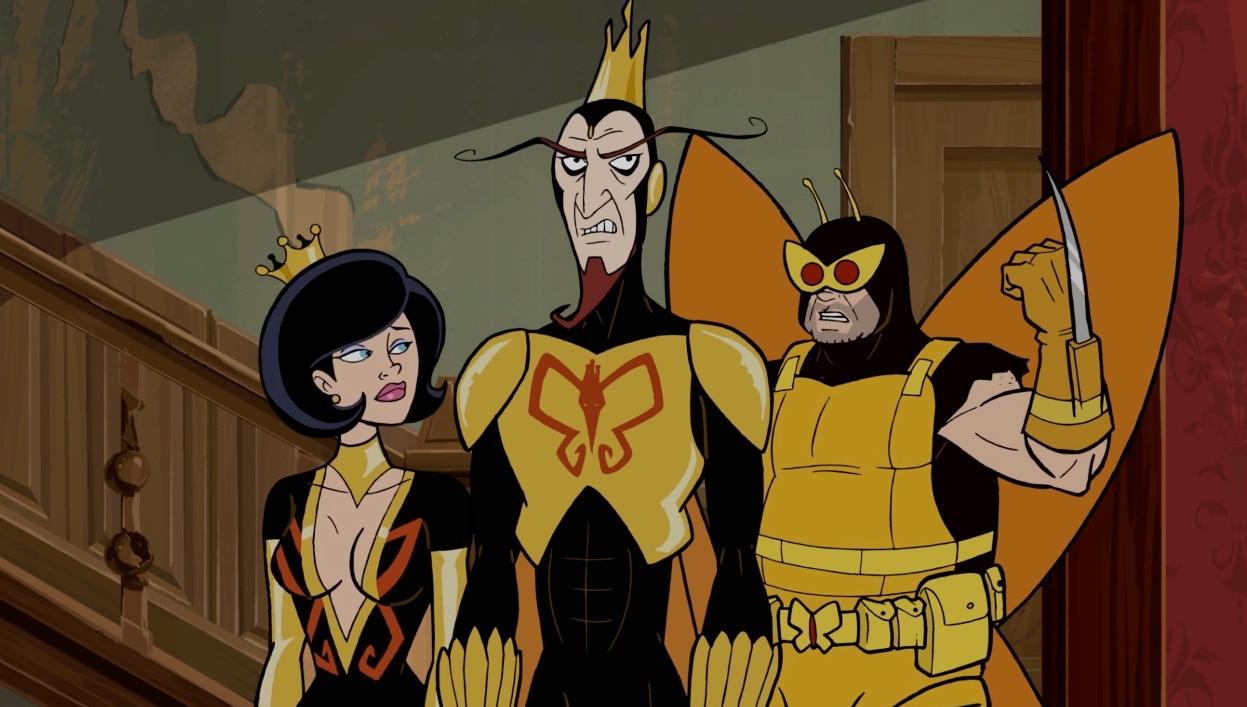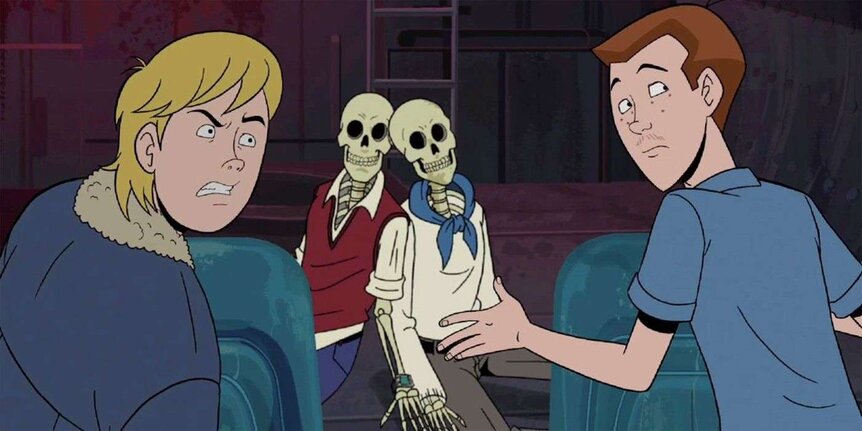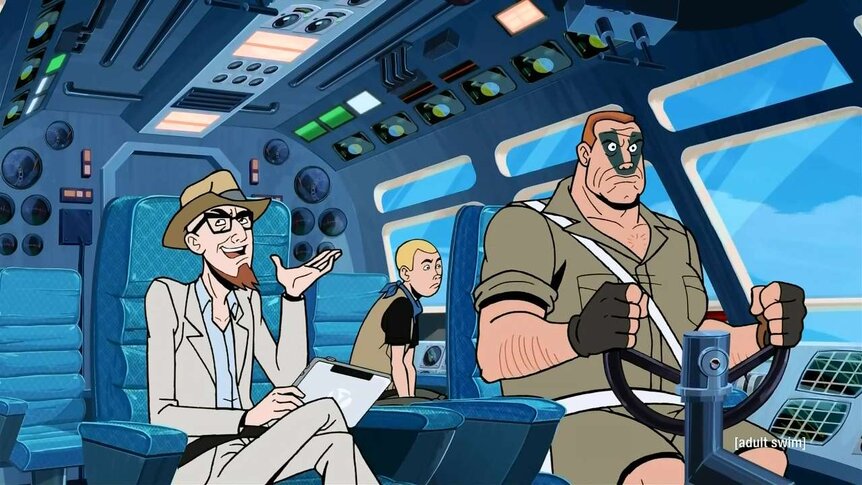Create a free profile to get unlimited access to exclusive videos, sweepstakes, and more!
How The Venture Bros. stumbled into the greatest superhero universe of all time

Back in the dark ages of 2003, years before HD programming was the norm, Cartoon Network’s Adult Swim premiered a strange new animated series called The Venture Bros., a satiric riff on the old Jonny Quest cartoon from the ‘60s. The show was far from a smash hit, but seven seasons and nearly 20 years later, the recently canceled Venture Bros. nonetheless leaves behind a cadre of devoted fans — as well as the accidental legacy of pop culture’s most expansive and tightly orchestrated superhero universe.
Writers Christopher McCulloch and Doc Hammer didn’t start out with the intent of creating a sprawling, interconnected universe that arguably surpassed DC, Marvel, and Hanna-Barbera combined even as it lovingly mocked them, but that’s what made the slow expansion of super scientists and archvillains into a wider world work so well. (As the brains behind DC’s live-action output and Universal’s Dark Universe can surely attest, working down from a bigger picture is a lot harder than it looks.) Even the current gold standard of the Marvel Cinematic Universe has stumbled here and there, ironically allowing The Venture Bros. to be the franchise that comes closest to capturing the impossibly deep continuity of Marvel and DC’s comic book histories.
Because while Marvel Studios talks a good game about everything being connected, The Venture Bros. always knew every part of its intricate backstory, even when the creators didn’t. McCulloch and Hammer rewatched old episodes and checked the fan wiki to make sure they weren’t stepping on their own toes, and then simply built — and built and built — on what was already there.
Take, for instance, Movie Night. A throwaway line in the first season about a disastrous viewing of Burt Reynolds’ Sharky’s Machine paid off over a decade later when that same incident is revisited in detail and revealed to have caused the death(-ish) of protagonist Dr. Thaddeus Venture’s father, the legendary adventurer Jonas Venture Sr. Back in Season 1, there was no need to make Movie Night anything other than what it was, a funny throwaway line, but the creators remembered and fleshed it out when it finally felt appropriate.
That ethos, of simply paying attention, permeated the entire run of The Venture Bros. There are few, if any, plot holes across the show’s seven seasons — and certainly not entire movies that need to be shrugged away to make sense of things. [cough] The Incredible Hulk [cough]. While whole corners of other universes — Marvel’s Netflix shows, or the disparate realities of DC Universe — are simply excused as part of the multiverse, their contradictions appended with a number, The Venture Bros. wasn’t afraid to lean in and explain everything.
In the fifth-ever episode of the series, “Eeney, Meeney, Miney ... Magic!”, a Doctor Strange-esque necromancer, Dr. Orpheus, moved into the Venture compound, despite the notion of such a man — and magic, really — being foreign to both Dr. Venture and the audience. But Dr. Orpheus remained nonetheless. He was eventually revealed to be part of the Order of the Triad, a team of supernatural warriors that included an alchemist and a vampire hunter, and then that team was given a history, too, crossing paths with other groups of side characters. Because while, say, Agents of S.H.I.E.L.D. had to split off into its own alternate timeline to make sense with the rest of the MCU, and Doom Patrol doesn’t exist in the same reality as the Titans show from which it spun off, everything really was connected in The Venture Bros.
The show ping-ponged between Jonny Quest- and Hardy Boys-styled plots, to riffs on G.I. Joe, Henry Kissinger, the Fantastic Four, and the Justice League — even the 1882 short story “The Lady or the Tiger.” And everyone got to be as weird and violent as they wanted to be; there was no fitting of rougher-edged characters to an established form, no PG-13 cuts of Deadpool to see if the Merc With a Mouth would play well with Mickey Mouse. Venture Bros. was, in many ways, similar to the Wild West of comicdom’s Silver Age, where teenage romantics and swamp monsters crossed over with superheroes without a second thought.
That weirdness and violence didn’t exist in a bubble, either — whether it was astronaut ghosts, supervillain henchmen, or simply years and years of existing in a world where things were always exploding, traumas were always taken to their logical extreme, and carried with characters as they jumped from genre to genre. Brock Samson, Dr. Venture’s bodyguard, is fundamentally broken due to his hyperviolence, something he struggles with throughout, even when babysitting; teenage sons Hank and Dean are sent reeling and rebelling after the discovery that they’re both clones that have died dozens of times over. Dr. Venture’s super-scientist daddy issues, meanwhile, are a key part of his character, from pilot to finale, not something tacked on in a sequel to make Tony Stark look less like a whiny, privileged rich kid.
Structurally, too, The Venture Bros. could be bolder in ways that allowed its world to be fleshed out without, really, doing anything. The second season includes only the second half of a two-parter (“Escape to the House of Mummies Part II”), which implies that things are going on that we, the audience, don’t see, but that are nonetheless important.
The show also based an entire episode’s structure — Season 4's premiere, “Blood of the Father, Heart of Steel” — around the degrading value of an issue of Marvel Comics #1, something that was symbolic of the characters’ awareness of their place in their world, expanding both the in-universe scope and the viewer’s understanding of such. Dr. Venture, after all, was the star of his own cartoon as a child, a fact that has ramifications on his adulthood; his children grew up with a literal legend for a grandfather.
The Boys and, to some extent, Harley Quinn have trod similar ground, with heroes and villains aware of their perception by others, and there are shades of commercialization with Captain America and Jessica Jones’ Trish Walker, but no other franchise has ever fully embraced its own history and celebrity the way The Venture Bros. did.
Not that the series was perfect — The Venture Bros. certainly suffered from the same issues of representation as the bigger franchises. The show’s lone, series-long female character, Dr. Mrs. the Monarch, was perpetually scantily clad, voiced by a man, and referred to almost exclusively with respect to her relationship with the Monarch. But her growth — both as a more developed character, and as her own woman embracing her independence and penchant for villainy — speaks to the expansiveness of the Venture Bros. world and its ability to organically evolve and course-correct. Dr. Mrs. the Monarch’s rise to a seat on the Guild of Calamitous Intent’s Council of 13 feels far more natural than Captain Marvel showing up in the 1990s and then leaving the galaxy for 30 years because no one felt like putting her in The Avengers.
That seamless evolution, where hard-cornered changes feel earned and backstories always fit, is indicative of the series as a whole. What started as an obscure parody turned itself into a sprawling, complicated universe, “a big enough umbrella,” according to McCulloch, with room for 100 strange and wonderful stories, branching out in ways that Marvel and DC are only now attempting. The game might not even have existed when they started, but The Venture Bros. changed it all the same.
Go Team Venture, indeed.




























